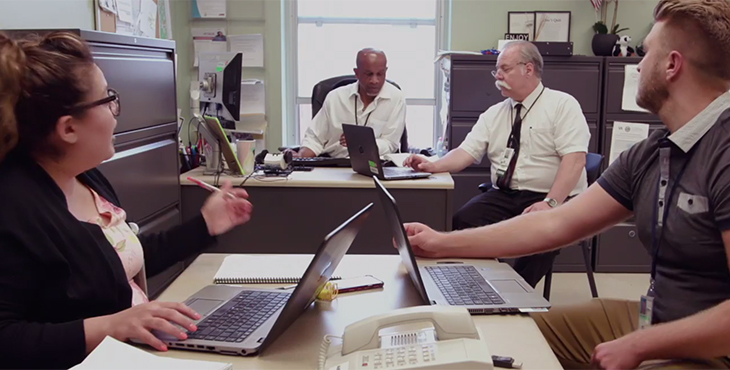At the darkest and most challenging time of his life, Sterling Brower was living under a bridge in Los Angeles, California. For two and a half years, Brower felt hopeless. He doubted he would ever get out of his living situation — he had a persistent drug problem, no support, and was surrounded by negative influences. But a VA outreach team found him and, after numerous attempts, persuaded him to enroll in services at the VA Welcome Center to start his journey toward recovery.
“I was struggling with getting sober and struggling with finding an avenue to do it,” Brower said. “VA gave me great living conditions and programs to achieve that.”
Since 2011, the Homeless Programs Office (HPO) at VA has developed several comprehensive, data-driven systems to understand the current and future needs of Veterans who are homeless or at risk of becoming homeless. These systems transitioned HPO from a pen-and-paper organization to a unit that uses modern information systems with real-time data to improve outcomes for homeless Veterans. The first system, Homeless Operations Management and Evaluation System (HOMES), was rolled out nationally in April 2011 and continues to be a comprehensive platform for documenting and tracking usage of VA homeless services by Veterans. This system enables VA staff to tailor the care of Veterans such as Mr. Brower to meet their unique clinical, supportive service, and housing needs.
In partnership with the Veterans Engineering Resource Center, HPO developed a gap analysis model that uses information from a variety of internal and external sources to show national and local VA leaders where resources need to be allocated to address Veteran homelessness. Additionally, HPO has developed multiple real-time data dashboards to provide VA field offices with essential performance insights about specific VA homeless services.
Recognizing that improving communication among case managers, nurses, and doctors is as important as developing systems that collect and compile data. HOMES allows homeless Veterans’ care teams to communicate more efficiently about the clinical, housing, and supportive service needs of specific Veterans who are homeless or at risk for homelessness. HPO staff also developed an operational planning system, known as the Integrated Operations Platform, that provides leaders of homeless programs with the tools to share best practices across the organization. This allows staff to learn not only from data but also from each other.
Together, these tools enable providers to better serve and care for Veterans by providing them with data about the needs of individual Veterans and about resources available to help them meet those needs, including permanent and emergency housing, substance abuse treatment, and access to community resources.
Heidi Marston, Director of Community Engagement and Reintegration Services at VA Greater Los Angeles Healthcare System, believes the data being collected by VA have improved drastically over the past couple of years. VA now has a more accurate count of homeless Veterans, along with specific information about each Veteran, which helps VA care teams determine how best to meet individuals’ needs.
“Moving toward the future, I think we can take data and make it even more nimble and accessible,” Marston said. “The more interactive we can be with everyone outside VA, the better job we will do at ending Veteran homelessness permanently.”
Check out the video below to learn more about how VA manages data to improve outcomes for Veterans who are homeless or at risk of becoming homeless.
More Information
- Visit VA’s website to learn about employment initiatives and other programs for Veterans exiting homelessness.
- Refer Veterans who are homeless or at imminent risk of becoming homeless to their local VA medical center, where VA staff are ready to assist, or urge them to call 877-4AID-VET (877-424-3838).
Keith Harris, PhD, Nicole Harelik, MBA, MPA, and Adam Ruege, LISW-S from Clinical Operations, National Homeless Program Office have led efforts over the past five years focused on the transformation and modernization of VA Homeless Program data systems to support field operations, improve outcomes and increase the timeliness and quality of Veteran care. Since implementation of these systems and with the increase in federal resources for homeless Veterans, the number of Veterans experiencing homelessness has dropped nearly 50%.
Topics in this story
More Stories
How much do you know about VA care, benefits and services? Don’t miss out on what you've earned—check out the "2025 VA Federal Benefits Guide for Veterans, Dependents, Survivors, and Caregivers" handbook to learn more.
VA has updated its process for awarding G.I. Bill benefits. This means that many Veterans who served multiple periods of military service (for example, Veterans who reenlisted) may be eligible for additional benefits for themselves or their beneficiaries.
Summer Sports Clinic is a rehabilitative and educational sporting event for eligible Veterans with a range of disabilities.









